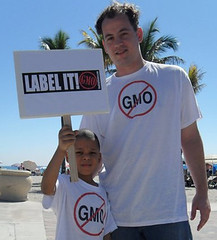The recent Senate rejection of an amendment to the Farm Bill, which would permit states to require labeling of GMOs in food and beverages clearly represents a suppression of consumers’ right to vote. A vote is defined as a “formal expression of a wish or will”. Therefore, when we purchase food and beverages, our selection is in essence a vote. The selection of food and beverages should be a willful choice; however, the withholding of information on food and beverage ingredients suppresses the consumers’ right to make informed choices.
During a debate on this amendment, which includes “generous support for crops like corn and soybeans that are often genetically modified“, senators from farm states overwhelmingly opposed the food labeling amendment. They feel that the issue of labeling should be left to the federal government. Also, they voiced concern that food labeling would result in increased costs of food. The supporters of the food labeling amendment state that a major problem with GMOs is that “the modified seeds “are floating from field to field, contaminating pure crops”. [1]
Upon analysis of the motives of the proponents and opponents of this amendment, is understandable that each side is backed by private interest groups, with the giant seed companies pushing against the amendment and the organic food companies lobbying to pass the food labeling amendment. It is disturbing, however, that the FDA and USDA have adopted the position that “the engineered foods they have approved are safe– so safe, they do not even need to be labeled as such– and cannot be significantly distinguished from conventional
varieties.[1] This position is a direct attack on consumers’ right to know and its right to “vote” in the marketplace by making informed choices on food and beverage selections. Clearly, the Senate is overstepping its boundaries.
As consumers, we have to protect our rights, particularly those that involve our very personal choices, i.e., food purchases. It is amazing that Congress is spending such an inordinate amount of time and effort to ensure that the American public has access to every detail of the Benghazi attack, the IRS‘ attack on the Tea Party or detainment of prisoners at Guantanamo, while working to deny us access to information that affects our health, survival and “right to vote”. I imagine that most readers would agree that the ingredients in the food that we feed our families trumps the details of the Benghazi attack.
Now more than ever we have to be extremely careful of protecting our voting rights, starting with the election of “public servants“. We need individuals in Congress who represent us and who trust us to be able to make informed choices, not those who would willfully suppress our right to information. The green movement needs your voice now. Let’s fight to protect our right to choose our food based on complete and accurate information on ingredients. To do so is to live green, be green.
__________________
Sources for this article:
[1] http://www.guardian.co.uk/world/2013/may/23/senate-gm-food-labeling-farm-bill.
[2] http://www.politicususa.com/bernie-sanders-calls-corporate-controlled-senate-rejecting-gmo-labels.html


